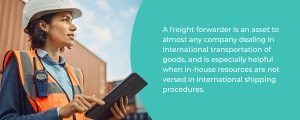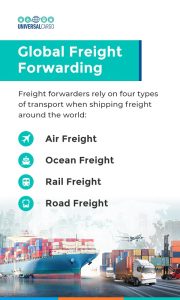
What Is a Freight Forwarder?
A freight forwarder is a company that arranges the shipping and storage of stock on behalf of its clients. Freight forwarders provide a comprehensive range of services, including tracking onshore transport, warehousing, arranging cargo insurance, securing cargo space, working out freight charges, filling out shipping and export documentation and freight consolidation. Freight forwarders will ship merchandise on their waybills, either by sea or air. They also work with third-party associates at various destinations worldwide to provide documentation, transport and other necessary services.
At their core, freight forwarders handle the commercial shipping of goods for other companies.

So what does that mean in terms of what a freight forwarder does?
What Does a Freight Forwarder Do?
Arranging international shipping is complex, with significant documentation and coordination required to handle it successfully. While freight forwarders handle all of the details, it is essential that you understand the role of a freight forwarder.
Freight forwarders act as intermediaries between a shipper and transportation services that might include ocean shipping, trucking, rail and expedited air freight. They work with several transport partners across multiple regions, countries and continents to ship merchandise.
A freight forwarding service will use already-established relationships with carriers to determine transport costs and shipping routes. They aim to choose economical routes that balance speed, price and reliability.
Transport is only part of the service that freight forwarders provide. They also have extensive knowledge of transport costs, banking practices, documentation and other regulations associated with shipping goods internationally. Forwarders leverage this knowledge to advise their clients on the most efficient and economical transportation route. Forwarders also handle tasks that would cause a considerable burden for clients, such as the logistics involved with shipping goods from one international destination to another.

Why Should I Work With a Freight Forwarder?
You can import and export goods on your own. However, importing and exporting merchandise involve a substantial amount of documentation and regulation that varies between countries. Partnering with international freight forwarders company ensures you can successfully ship goods worldwide.
Knowing the shipping companies, the documentation and the customs laws of various countries is a freight forwarder’s job. Working with an experienced freight forwarding company can help you save time and money and provide reliable product transportation at competitive rates.
Any company dealing in the international transportation of goods could benefit from a freight forwarder. It is advantageous, especially when in-house team members and resources are not fully equipped to handle international shipping procedures.
Some of the benefits of working with a freight forwarder include the following:
- Accountability
- Experience
- Knowledge of shipping seasons
- Ancillary services like tracking
- Relationships with global partners
- Cargo tracking
- Compliance
- Excellent customer service
- Warehousing
- Risk management and assessment
- International payment methods
Global Freight Forwarding
Freight forwarders rely on four types of transport when shipping freight around the world: air, ocean, rail and road freight. Each type of transport is necessary when exporting and importing goods.
Global freight forwarders make use of each type of freight to ship goods around the world. The type of freight will depend on the country being exported from or imported to. In many cases, a combination of all four is used to ensure that goods arrive on time and in the most economical way.
Some common countries that American businesses import from include:
- Vietnam
- Thailand
- Singapore
- China
- Indonesia
- Malaysia
Air Freight
Air freight forwarding ships cargo by air over large distances. Everyday items in air freight shipments include vehicles, food, manufacturing parts, clothes, electronics and more. The use of air freight is growing around the world as it is seen as port delays and other challenges impact ocean freight. Air freight is the fastest of all shipping methods.
Common air export destinations from the U.S. include:
- Germany
- United Kingdom
- Spain
- Netherlands
- Asia
Ocean Freight
Shipping cargo over the ocean is known as ocean or sea freight. Ocean freight is the most versatile of the shipping methods as it can handle large amounts of goods of varying sizes. It is more cost-effective than air freight but takes longer for goods to be shipped.
Rail Freight
More oversized items or bigger loads that aren’t suitable for trucks are transported via train on railway systems. Rail freight is cheaper than air and ocean freight but takes longer to transport goods. It is a good alternative for transporting goods over large land distances without incurring high costs.
Road Freight
Road or ground freight is used to deliver goods within a country, to neighboring countries and between ports and distribution centers. Road freight is also the cheapest of all the freight methods. This specialized form of trucking regularly carries high-value goods and stock that requires refrigeration.







